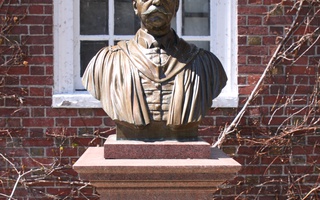“Letting a scholar loose in your library is like letting a child loose in a candy store with a thousand dollar bill,” a researcher once told a librarian at the Francis A. Countway Library of Medicine. As one of the world’s largest collections of rare books, artwork, artifacts, and specimens documenting the evolution of medicine, Countway is one of Harvard Medical School’s hidden gems and a valuable resource for the Boston academic community at large.
Only a 20-minute bus ride from Harvard Square, the library houses a treasure trove of some of the world’s most famous medical texts and anatomical specimens. Over the past several months, Harvard College’s Office of the Senior Associate Provost and the Harvard Library Strategic Conversations program have been hosting a series of presentations focusing on specific artifacts available around the university called “A History of Objects.” Countway is among the libraries featured.
Countway, founded in 1965, ranks as one of the largest medical libraries in the world. It serves as a resource for students, faculty, and residents of the greater Boston area and is a major asset to the Harvard Medical School, Harvard Dental School, and Harvard School of Public Health. The library also houses the Warren Anatomical Museum, and the HMS medical museum.
Over the years, Countway has contributed much to the inquisitive medical minds that venture forth in the name of discovery and understanding. The library–which showcases prime medical artifacts and houses texts both ancient and electronic—is a link between America’s oldest medical traditions and cutting-edge literature.
SPECIMENS & ARTIFACTS
The Warren Anatomical Museum has grown from its humble beginnings in 1847 as the personal teaching collection of renowned Harvard surgeon John Collins Warren to an assortment of over 15,000 items. The large collection comes as both a blessing and a burden, according to Countway Public Services Librarian Jack Eckert.
“Most of the collection isn’t on display because we don’t have exhibit areas,” he said. “We tend to rotate exhibits a couple of times a year, generally with some kind of thematic idea”.
The Museum’s most famous pieces are on display for the public’s enjoyment year-round at the Warren Anatomical Exhibit. One such specimen is the skull of Phineas Gage, an American railroad construction foreman who survived an accident in which a large iron rod passed through and destroyed much of his frontal lobe. His case study was momentous in elucidating the importance of the frontal lobe in shaping human personality and behavior.
“We definitely have a lot of articles written on the Phineas Gage skull,” said Elizabeth Eggleston, Director of Collections and Management Knowledge at the Countway Library of Medicine. “We are also lucky to have a daguerreotype of what we believe is Phineas Gage with that rod.”
Although the museum is most famous for this specimen, the library also houses a variety of other artifacts, including a letter signed by Thomas Jefferson and photographs of President James A. Garfield’s vertebrae.
“I’m particularly fond of the radiographic prints of [Russian Tsar] Nicholas and [his wife] Alexandra done in 1898,” said Eckert. “To me they’re particularly beautiful and evocative images, especially when you think about what happened to these people.”
Though Countway currently has limited opportunities for students to interact with these precious artifacts, the librarians hope this will change in the coming years.
“This is meant as a teaching collection, and the hope is that as time goes on and the library is able to develop the collection, more students will be able to be involved,” said Eggleston.
A RICH HISTORY
From its inception, the Countway Library has collected and preserved the texts of Boston’s medical community. Created as a merger of the Boston Medical Library and the Harvard Medical Library, Countway benefits greatly from its diverse benefactors.
Read more in News
Junior Faculty Suffer From Reduced Research FundingRecommended Articles
-
University Seals Benda PapersHarvard University lawyers yesterday ordered Medical School librarians to close off public access to the papers of a former faculty
-
Cultural LootFor too long, museums in Western Europe and the United States have jealously clung to objects to which they have no underlying valid claim. As a rule, they should begin returning them to the many nations of Eastern Europe, the Middle East, Asian and others who now have the ample resources to take care of them.
-
 From the Archives: Behind the Veritas Shield
From the Archives: Behind the Veritas Shield -
Federal Appeals Court Rules in Favor of Harvard Retaining its ArtifactsIn a decision handed down last Wednesday, a federal appeals court held up a prior decision that a group of terrorism victims who won a judgment against Iran will not be allowed to claim Iranian artifacts in Harvard’s art museums as compensation for damages owed to them.
-
One Year after Marathon Bombings, Countway Library’s Digital Archive Commemorates Emergency Medical ResponseThe Countway Library of Medicine is continuing its efforts to expand “Strong Medicine,” a digital archive that captures and compiles the stories of last year’s emergency respondents.
-
 Art House
Art House













